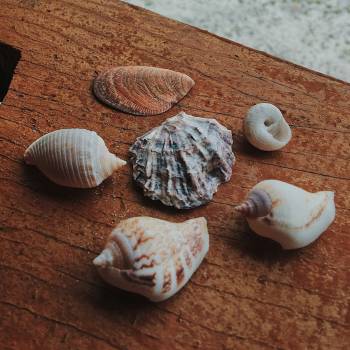بسم الله الرحمن الرحيم
How do we show our love towards the people whom we love? We do our best to do what makes them happy, and we steer clear from what makes them feel sad or angry.
But how do we show our love towards Allah? This question has actually been answered by Allah ta'ala Himself:
“Say (O Muhammad ﷺ to mankind): If you love Allah, then follow me (i.e. follow the way of Rasulullah ﷺ). Allah will love you, and forgive you your sins. And Allah is Oft-Forgiving, Most Merciful.” [Surah Ali Imran 3:31]
The proof of our love towards Allah subhanahu wa ta'ala is that we adhere to the sunnah of Rasulullah salla Allahu ‘alayhi wa sallam (ﷺ) as much as we can — and there are many sunnan (plural for sunnah) we can learn and start practising from Hisnul-Muslim. Here are 2 sunnan that may be less known to many, yet easy to do and come with massive rewards!
🌸 Reward: Jannah will be made obligatory
There is a hadith recorded in Sahih Muslim 234 mentioning these two sunnan altogether. It begins with a companion, by the name of ‘Uqba ibn 'Amir radhi Allahu ‘anhu, who said:
“We were entrusted with the task of tending the camels. On my turn when I came back in the evening after allowing them to graze in the pastures, I found Rasulullah (ﷺ) standing and addressing the people. I heard these words of his:
If any Muslim performs wudhu’ (ablution) well, then stands and prays two (voluntary) raka’aat setting about them with his heart as well as his face, Jannah would be guaranteed to him.”
This is one of the first sunnan mentioned in the hadith, and it is absolutely amazing. Rasulullah ﷺ said that if any of us:
(1) does wudhu’ as perfect as we can (i.e. properly as per the sunnah, as well as allowing the water to reach every part of the necessary limb correctly), and after that
(2) performs a voluntary prayer of 2 raka’aat with the maximum level of khushoo’ (concentration) as much as we can possibly achieve,
(3) then Jannah will be made *obligatory* for us! Subhana Allah.
According to scholars, we can combine intentions when doing the 2 raka’aat prayer after wudhu’ with any other voluntary prayer. So for example, a person makes wudhu’ because he wishes to pray the sunnah before Fajr prayer. So he may pray two voluntary rak‘aat intending them to be the two rak‘aat after wudhu’, as well as the sunnah before Fajr. From this, he will attain the reward of two different prayers in just these two raka’aat — alhamdulillah!
Notice also that from the Mercy of Allah subhanahu wa ta'ala, He makes Jannah obligatory for a voluntary prayer a believer does after proper wudhu’. One cannot fathom how much more Allah rewards when we safeguard our daily obligatory prayers, and perform them properly.
So when ‘Uqba heard this, he was amazed as well! He said: “What a fine thing this is (i.e. what an incredible reward)!” Another man heard his amazement, and said: “The first was even better than this (i.e. what Rasulullah ﷺ mentioned earlier was even greater than this).”
🌸 Reward: Enter Jannah through any of its eight gates
When ‘Uqba looked at the man who spoke to him, he realised it was 'Umar ibn Al-Khattab radhi Allahu ‘anhu. Indeed, the companions radhi Allahu ‘anhum were always eager to hear and learn from Rasulullah ﷺ. ‘Umar thus mentioned to ‘Uqba what Rasulullah ﷺ said earlier:
“If anyone amongst you performs the wudhu’, and then completes the wudhu’ well, and then says: ‘I bear witness that none has the right to be worshipped but Allah alone, and that Muhammad is the servant of Allah and His Messenger’, the eight gates of Jannah would be opened for him, and he may enter by whichever of them he wishes.”
This is the second sunnah, and it is the most amazing part of the hadith! Rasulullah ﷺ said that:
(1) if anyone does wudhu’ as perfect as he can, and afterwards
(2) he declares the testimony of iman, i.e.:
أَشْهَدُ أَنْ لاَ إِلَهَ إِلاَّ اللَّهُ
وَأَنَّ مُحَمَّدًا عَبْدُ اللَّهِ وَرَسُولُهُ
Ash-hadu allaa ilaaha 'illa Allah,
wa anna Muhammadan 'abdu Allah wa Rasuluhu
(I bear witness that none has the right to be worshipped but Allah alone,
and that Muhammad is the servant of Allah and His Messenger)
(3) then the eight gates of Jannah will be opened for him, and on the Day of Judgement, he will be allowed to enter any of those doors as he wishes!
Again, the hadith did not once mention praying the fardh salaah, but look at the massive rewards that come if we just do wudhu’ properly! Notice also that the testimony of iman has two parts:
(1) “I bear witness that none has the right to be worshipped but Allah alone” — this is the testimony of believing in Tawheed, and rejecting all forms of shirk.
(2) “and (I bear witness) that Muhammad is the servant of Allah and His Messenger” — this is the testimony of believing in Rasulullah ﷺ and his sunnah, and rejecting all types of bid’ah (i.e. innovation in the religion).
The testimony of iman itself describes the proper and correct way for us to show our love to Allah subhanahu wa ta'ala. We ask Allah to make it easy for us to follow the sunnah of Rasulullah ﷺ, and grant us the full reward of these acts of worship.
May Allah make us among those who love Him, and those whom He loves!
Your sister in Deen,
Aida Msr
 Aida Masuri Mustafa
Aida Masuri Mustafa 





Hania Aslam
Abbass Mohammed
Aida Masuri Mustafa
Fatimah zahra Mohammed